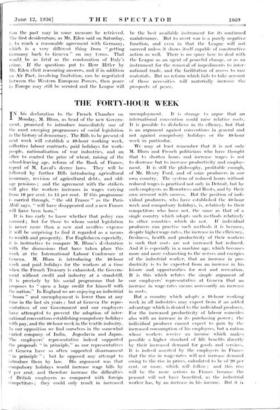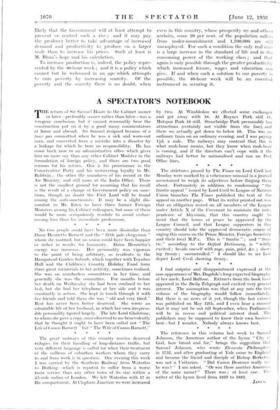THE FORTY-HOUR WEEK
IN his declaration to the French Chamber on Monday, M. Blum, as head of the new Govern- ment, promised to introduce immediately one of the most sweeping programmes of social legislation in the history of democracy. The Bills to be presented next week will establish a 40-hour working week, collective labour contracts,• paid holidays for work- people, nationalisation of war industries, and an office to control the price of wheat, raising of the school-leaving age, reform of the Bank of France, repeal of M. Laval's decree laws. They will be followed by further Bills introducing agricultural insurance, revision of agricultural debts, and old- age pensions ; and the agreement with the strikers. will give the workers increases in wages varying from 10 per cent. to 15 per cent. If this programme is carried through, " the old France " as the Paris Midi says, " will have disappeared and a new France will have been born."
It is too early to know whether that policy can succeed ; but for those to whom social legislation is never more than a new and needless expense it will be surprising to find it regarded as a means to wealth and prosperity. For Englishmen especially, it is instructive to compare M. Blum's declaration with the discussions that have taken place this week at the International Labour Conference at Geneva. M. Blum is introducing the 40-hour week and paid holidays for the workers at a time when the French Treasury is exhausted, the Govern- ment without credit and industry at a standstill. It is precisely by his social programme that he proposes to " open a large credit for himself with the nation." In England we are enjoying an industrial boon " and unemployment is lower than at any time in the last six years ; but at Geneva the repre- sentatives of our Government and our employers have attempted to prevent the adoption of inter- national conventions establishing compulsory holidays with pay, and the 40-hour week in the textile industry. In our opposition we find ourselves in the somewhat varied company of India, Jugoslavia and Japan. The employers' representative indeed supported the proposals " in principle," as our representatives at Geneva have so often supported disarmament " in principle " ; but he opposed any attempt to introduce them by law. His argument was that compasory holidays would increase wage bills by 2 per cent. and therefore increase the difficulties of British. employers as compared with foreign competitors ; they could only result in increased unemployment. It is strange to argue that an international convention could raise relative costs.
It is possible to disbelieve in its efficacy, but that is an argument against conventions in general and not against compulsory holidays or the 40-hour week in particular.
We may at least remember that it is not only M. Blum and French politicians who have thought that to shorten hours and increase wages is not to decrease but to increase productivity and employ- ment. It is still the philosophy, profitable enough, of Mr. Henry Ford, and of sonic producers in our own country. The system of reduced hours without reduced wages is practised not only in Detroit, but by such employers as Rowntrecs and Boots, and by their own account with success. But the position of indi- vidual producers, who have established the 40-hour week and compulsory holidays, is, relatively to their competitors who have not, the same as that of a single country -which adopts such methods relatively to other countries which do not. If individual producers can practise such methods it is because, despite higher wage-rates, the increase in the efficiency, freshness, health and productivity of their workers is such that costs are not increased but reduced. And it is especially in a machine age, which becomes more and more exhausting to the nerves and energies of the industrial worker, that an increase in pro- ductivity is to be expected from an increase in his leisure and opportunities for rest and recreation. It is this which refutes the simple argument of our employers' representative at Geneva that an increase in wage-rates means necessarily an increase in costs.
But a country which adopts a 40-hour working week in all industries may expect from it an added advantage which is denied to the individual producer. For the increased productivity of labour coincides also with an increase in its purchasing power ; the individual producer cannot expect to gain by the increased consumption of his employees, but a nation whose workers receive an income which makes possible a higher standard of life benefits directly by their increased demand for goods and services. It is indeed asserted by the employers in France that the rise in wage-rates will not increase demand owing to the rise in prices, calculated to be of 20 per cent. or more, which will follow ; and this rise will be the more -serious in France because the peasant will not have benefited, as the industrial worker has, by an increase in his income. But it is likely that the Government will at least attempt to prevent or control such a rise ; and it may pay. t he producer better to take advantage of increased' demand and productivity to produce on a larger scale than to increase his prices. Such at least is M. Blum's hope and his calculation.
To increase production is, indeed, the policy repre- sented by the 40-hour week ; and it is a policy which cannot but be welcomed in an age which attempts to cure poverty by increasing scarcity. Of the poverty and the scarcity there is no doubt, when even in this country, whose prosperity we and others acclaim, some 20 per cent. of the population suffers from under:rionrishinent and -1,700,000 are' still unemployed. For such a condition the only real cure is a large increase in the standard of life and in the consuming power of the working class ; and that again is only possible through the greater productivity which increased leisure, wages and education can give. If and when such a solution to our -poverty is possible, the 40-hour week will be an essential instrument in securing it.























































 Previous page
Previous page